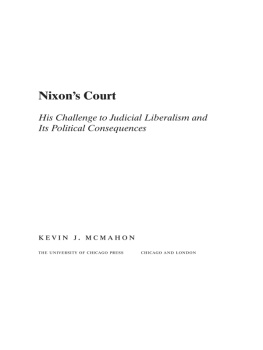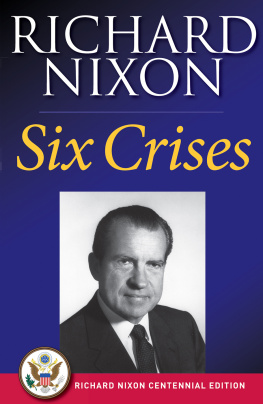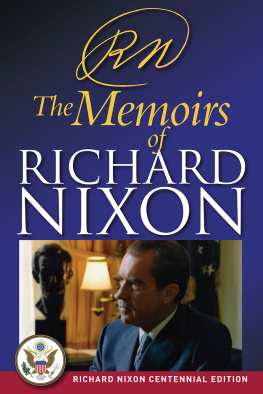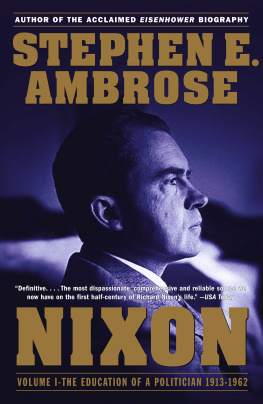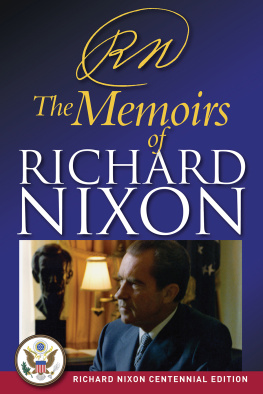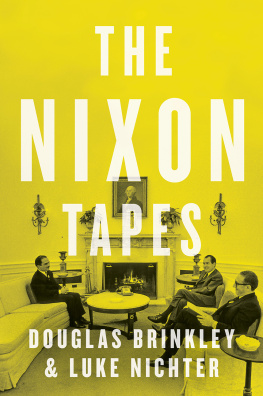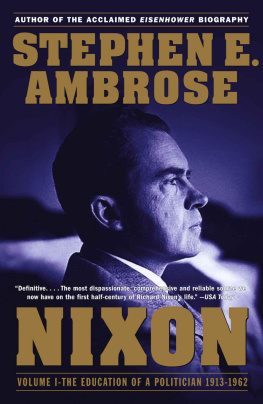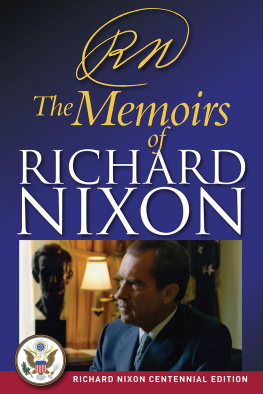Originally published in 1972 by Basic Books, Inc.
Published 2016 by Transaction Publishers
Published 2017 by Routledge
2 Park Square, Milton Park, Abingdon, Oxon OX14 4RN
711 Third Avenue, New York, NY 10017, USA
Routledge is an imprint of the Taylor & Francis Group, an informa business
New material this edition copyright 2016 by Taylor & Francis.
All rights reserved. No part of this book may be reprinted or reproduced or utilised in any form or by any electronic, mechanical, or other means, now known or hereafter invented, including photocopying and recording, or in any information storage or retrieval system, without permission in writing from the publishers.
Notice:
Product or corporate names may be trademarks or registered trademarks, and are used only for identification and explanation without intent to infringe.
Library of Congress Catalog Number: 2015046976
Library of Congress Cataloging-in-Publication Data
Names: Mazlish, Bruce, 1923- author.
Title: In search of Nixon : a psychohistorical inquiry / Bruce Mazlish ;
with a new foreword by Howard G. Schneiderman.
Description: New Brunswick : Transaction Publishers, 2016. | Includes bibliographical references and index. | Originally published: New York: Basic
Books, 1972.
Identifiers: LCCN 2015046976 | ISBN 9781412855648 (pbk.) |
ISBN 9781412855471 (ebook)
Subjects: LCSH: Nixon, Richard M. (Richard Milhous), 19131994
Psychology. | PresidentsUnited StatesBiography.
Classification: LCC E856 .M27 2016 | DDC 973.924092dc23 LC record
available at http://lccn.loc.gov/2015046976
ISBN 13: 978-1-4128-5564-8 (pbk)
Foreword to the Transaction Edition
Stress, Crisis, and Psychohistory: In Search of Nixon
Howard G. Schneiderman
Over two decades since his death in 1994, Richard Nixon remains an enigmatic and fascinating figure in American political history, and Bruce Mazlish's In Search of Nixon stands out as an early and innovative effort to use psycho-history to uncover the man and his motives. This, and a continuous interest in our thirty-seventh president not only justifies a new edition of In Search of Nixon, but also makes it invaluable to understanding one of the strangest and most conflicted men ever to occupy the Oval Office.
One might well ask why this book is worth reading today, so long after it was published in 197 2. Actually, Bruce Mazlish gave me a good answer to this question in an interchange of letters between us: In Search of Nixon is relevant today because, as Mazlish says, Nixon had a "convoluted personality," and a "complicated record." But while people sensed Nixon's personality traits in 1972, it was not until after his resignation in 1974, as a result of the Watergate scandal, and later during his efforts at self-rehabilitation as a writer and an advisor to his successors about foreign policy, that Nixon was more fully revealed.
As for Nixon's record as president, most of it was still to come after the publication of In Search of Nixon, thus making this book something of a prequel, if not an anticipation of how Nixon's presidency might turn out. Mazlish had no crystal ball, but his analysis of Nixon's personality and behavior leads the reader to think that both Nixon's success and failures in foreign and domestic policy, and his monumental meltdown in the disgraceful Watergate affair were, if not predictable, at least they were no surprise because what Mazlish says about Nixon in 1972 could have helped predict Nixon's performance in office and beyond.
When In Search of Nixon was first published in 1972 it received a number of unfavorable reviews from other historians. Looking backward over the more than four decades that have since passed, it is clear that Bruce Mazlish's "psychohis-torical inquiry," as he called it, deserved a better reception than it first received. Indeed, Mazlish's "inquiry" into the character of America's thirty-seventh president helped lay the foundation for the now well-established psychohistorial approach in history. What makes In Search of Nixon doubly interesting today is not only that it is a pioneering work in psychohistory, but also that it was written in the midst of the Nixon presidency, but before Richard Nixon became the only president who resigned from office. The insightfulness of In Search of Nixon may well be judged, at least in good measure, by its author's ability to help the reader understand the self-destructive actions that led Nixon to resign in the face of the Watergate crisis.
Indeed, crisis is a term that Nixon himself used to define the most momentous events in his political life. A mere ten years before Mazlish's book was published, Nixon's first book, Six Crises, appeared in print. Six Crises is a highly selective autobiographical statement in which Nixon carefully discusses his place in six politically charged events that helped form his character leading up to his presidency. As Mazlish notes, however, what Nixon leaves out of these accounts is as revealing as what he includes. Given the manner in which Nixon embraces his part in these events, I am tempted to think of his book as being more aptly titled, My Six Crises. The irony here, of course, is that looking back, it was Nixon's unanticipated seventh crisisWatergatethat made the largest impact on his life, and the life of the nation.
What were the six crises that Nixon described? First was the Alger Hiss case, during which, in 1948, Nixon served on the House of Representative's Un-American Activities Committee that was investigating communism in America. Second, was what he labeled the Fund Crisis, in which Nixon was running for Vice President on Dwight Eisenhower's ticket in 1952. He was accused of having an illicit campaign fund, and Eisenhower was considering dropping Nixon as his running mate. Nixon saved himself by delivering the famous "Checker's speech," referring to his dog named Checkers, in which Nixon averred his innocence, and said he would never give the dog back to its donor. The third crisis was precipitated by President Eisenhower's heart attack in 1955 when as vice president Nixon became in his words an "acting president" for a few weeks. Nixon's fourth crisis took place in 1958 while Vice President Nixon and his wife were attacked in their limousine by a mob in Venezuela. The fifth crisis was Vice President Nixon's so-called "kitchen debate" with Nikita Khrushchev in Moscow in 1959. The final crisis described by Nixon was the 1960 presidential campaign which ended with John F. Kennedy winning the presidency by a slim margin.
Mazlish discusses Nixon's six crises, and sees each of these as revealing something about his character. But as a superior theoretician, well-versed in psychoanalytic concepts, as well as with the literature of social science, Mazlish helps us to understand Nixon's personal psychology, as well as the temper of his time. In many if not most ways, Nixon was a typical American in his hopes and fears for America in the Cold War era. Beyond standard issue reactions to a new post-war world, however, Nixon projected his own characteristic self-image onto new waves of Communist enemies, and in Mazlish's words, "Nixon pictured himself as the warrior preserving the American way of life" This warrior self-image allowed Nixon to normalize what Mazlish calls "his paranoid fear of Communism" with a heavy-handed ideological strategic stance to take on Communism, and to defeat it. Pulling together one example after another from their random dispersal, Mazlish shows that Nixon's paranoia extended beyond Communists to his political opponents who were seen as "enemies," crooks," bums," and other "cynical seekers of power." In this regard, Mazlish provides us with a powerful insight into Nixon's constant ambivalence about friends and enemies. That ambivalence is demonstrated in Nixon's proclamation that "I'm a pragmatist with some deep principles that never change," and in Mazlish' pointed remark that Nixon simply needed enemies onto whom he could "project aggressive feelings."


